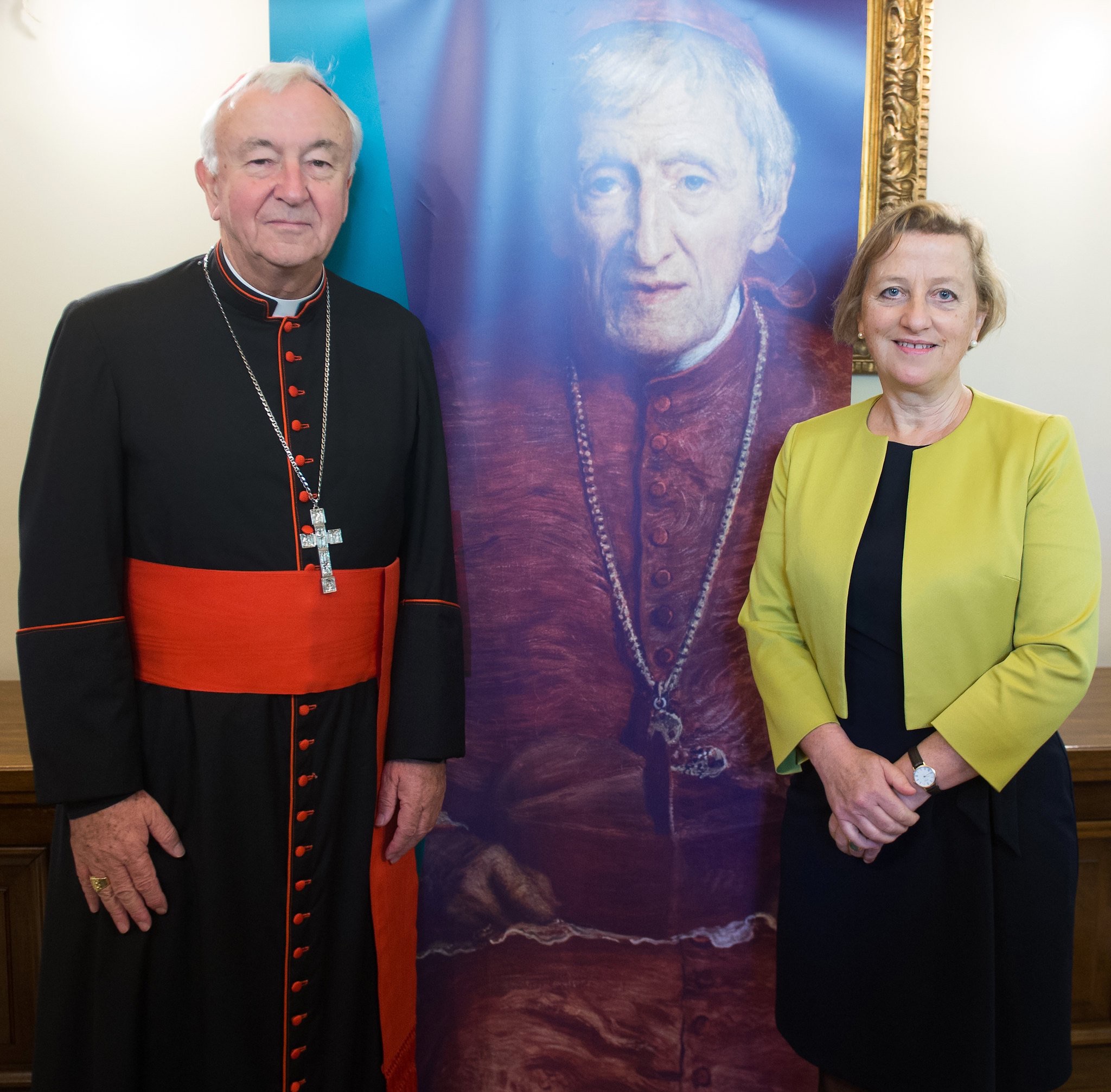Britain gained its first saint in more than 40 years when John Henry Newman, a 19th-century cardinal, was canonised yesterday morning in St Peter’s Square in the Vatican City.
Photo above – Prior to Cardinal Newman’s canonisation , Cardinal Vincent Nichols and Mrs. Sally Axworthy, HM Ambassador to The Holy See and I hosted a symposium in celebration. May he inspire us to look to deeper horizons of solidarity between people of the same Christian faith and explore contacts with other faiths.
The Prince of Wales was among the thousands of Britons in attendance when Pope Francis celebrates Mass.
The Prince has lauded Cardinal Newman, an Anglican who converted to Catholicism in 1845, as a saint our age desperately needs, a theologian who could “advocate without accusation” and “disagree without disrespect”.
Behind the scenes, however, the Catholic Church is conducting a rancorous debate over its future, in which Newman will almost certainly be invoked by liberals and conservatives alike.
Amid preparations for the Sunday canonisation, the Vatican was hosting a council, or synod, to debate evangelisation in the Amazon, and conservatives fear that this time it will give the green light to married priests.
Liberals in the Catholic Church take Newman’s teachings to mean that the Church can change its mind over certain subjects – including the celibacy of priests.
Newman’s legacy leaves two key ideas.
Newman’s legacy leaves two key ideas. The first is that the Church must listen to local congregations, or laity; the second is that Church teaching, or doctrine, “develops” over time.
At present, the Amazon region in South America has a chronic shortage of priests. Some reformers insist that what the locals want most is the ordination of married men, not just to raise recruitment but to reflect better the culture of the area.
Conservatives say that if the Amazonians cannot understand celibacy then it is the job of the Church to explain it to them. Conservatives call this the mission of the Church; some liberals regard it as closer to European colonialism.
As Vatican City was abuzz ahead of yesterday’s events, Cardinal Raymond Leo Burke, often dubbed America’s leading clerical critic of Pope Francis, told “The Sunday Telegraph” in Rome that he was praying to Newman to “intercede” to protect the Church from error. However, influential figures, such as the journalist Christopher Lamb, Rome correspondent for the Catholic publication “The Tablet”, argued that Newman would have approved of the synod. “His spirit is now here,” he says. “The ideas that he put forward have now embedded in the Church.”
Mr Lamb has accused some Catholics in the media of making “demeaning, xenophobic and at times racist remarks” against indigenous peoples during the synod.
He sees Newman as having been critical of an over-mighty, Eurocentric church and favouring greater decentralisation. “The power of the Catholic Church is that you can be totally part of your local culture but also part of the universal church,” he says. “That’s what Newman was.”
Cardinal Burke, however, fears Newman is sometimes “subject to misinterpretation”. Sitting in his Roman apartment, with letters by Newman framed on the wall, the Cardinal suggested that the Church can only properly consult communities on faith matters when that community is already Catholic.
“For instance, in the working document of the synod, it says that when we go into these pagan places and places where the gospel hasn’t been preached, we go there looking for revelation in the culture itself.” The synod’s preparatory document calls “the Lordship of Christ … into question because Christ is just one more element of what they call the Cosmos”. The cardinal is careful with his words, but grassroots conservative clergy are increasingly more outspoken.
Over lunch near the Vatican, Fr Ed Tomlinson, a parish priest from Kent, argued that the Amazon question is being used for a broader assault on Church teaching by Sixties liberals.
“What we’ve really got is the boomer generation once again trying to sell us the sexual revolution … speaking through the mask of the Amazon because it (a) hides their true motives and (b) it means anyone who criticises them can be described as racist.”
He finds it suspicious that there is such an overlap between the aims of European liberal priests and indigenous peoples: “It just seems a little neat to me.”
The Rev Dr Stephen Morgan, a Catholic deacon, suggests the subtlety of Newman’s teaching is being lost. Newman did identify that things can change within the Church but “things change in order to remain the same… which is why [Newman] uses images drawn from biology. Someone looking at your face now is looking at a face that has developed since you were a three-year-old. But it’s still the same person.”
Conservatives are worried that the synod is being used to tweak practices in a way that will fundamentally alter not just the appearance but the character, even the beliefs of the Catholic Church.
On the other hand, Austen Ivereigh, a sympathetic biographer of Pope Francis, says that ultimately “consultation and deliberation on matters of Church discipline and faith are now part of the norm of this pontificate and here’s an obvious link with Newman’s teachings”.
Although he was a thorough believer in Catholic doctrine and authority, Newman, says Ivereigh, disliked authoritarianism and centralisation “in a very English way… he very honestly looks for the truth and is prepared to go wherever the truth takes him. He is a conscience hero. That’s very modern,” which is perhaps what makes him so appealing today.
Newman “is a searcher, and we live in an age of religious searching.”
Based on article by Tim Stanley in The Sunday Telegraph, Sunday October 12, 2019
Image-1.db434ec43f08491aa271c90c87e080f4.jpg



